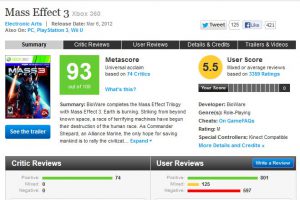Recently social media strategist Brent Robinson wrote a blog on the benefits to your brand of addressing on-line customer reviews. His blog states not surprising statistics that 84% of consumers research product on-line prior to making a purchase and 70% of consumers read on-line reviews before they buy a product as well. Clearly consumers have become more savvy and have more information available to them to make informed buying decisions. I give a lot of credence to peer reviews, especially when you know the person who has used said product. There is a personal quotient here and greater trust. By reading a review presumably written by a fellow consumer, you already have the common bond of like interest in a specific thing.

When I am looking into buying music, I use www.metacritic.com. Metacritic aggregates reviews written by respected publications for movies, shows, video games and new album releases and quantifies (in as much as you can quantify the quality and appreciation for something as subjective as art), provides an average rating and then allows for site viewers to submit their own scoring. I can read any specific reviews if I like, or if scoring is so disparate that I need to examine publications whom I respect more than others, I can do further research. I always like to see how average listeners like myself rate an album versus Pitchfork or Rolling Stone. So I think putting user reviews out on your site can be a powerful testimonial to the quality of your brand and can build trust with your target consumer.
The peril with allowing users forums on your site is that negative reviews can turn away new customers and tarnish your brand. However, the way in which you respond to legitimate criticism can be a major positive. Tara De Marco makes salient points in her blog from earlier this year offering lessons on how to respond meaningfully to poor reviews. Responding to negative reviews can also address potential product misuse as the culprit of a negative user experience and help direct future customers. This should be a no brainer. I am a stickler for customer service. I don’t remember bad experiences in retail or at a restaurant as much as the way in which the issue was handled. I can usually tell if the response is a product of hiring or institutional policy. Either way, I will always patronize businesses that own their mistakes and rectify them. I wrote a scathing on-line review for a local restaurant after my family had to walk out after not getting served for over an hour and barely acknowledged by staff during the nightmarish wait. (I realize this is a first world concern). When we left, we had to wait longer for our waiter to ring up the one beer and three Cokes that we had long since finished. Had he put the drinks on the house and asked us to try them again, I would not have taken the time to submit the damning review. I have a feeling the owners would have cringed but I legitimately wanted to save someone else the misery and let the restaurant know they had an issue.
Dr. M. Joy Hayes of Daily Finance writes about the issue of fake user reviews in her piece found on dailyfinance.com. However, these reviews tend to be endorsements. Businesses obviously should not pad their numbers and encourage or employ false reviews, but the negative ones need to be addressed post haste. Consumers give credit for businesses that want to clarify, educate, rectify and listen. I had a manager who offered ideas frequently. After being met by the sound of crickets to his ideas, he finally said, “I’ll assume that your silence means enthusiastic support.” Usually that is the opposite of what the silence met but it makes a point… Silence to a negative review makes it look like the company agrees with the reviewer and has little to add or, doesn’t care.

